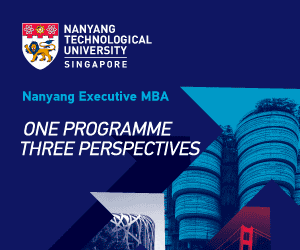Graduate Studies Blog

NANYANG EXECUTIVE MBA
Master Global Leadership & Cultural Dexterity with the Nanyang Executive MBA
Effective leadership requires more than strong communication skills in today’s volatile business landscape. To thrive, adopting a global mindset is more vital than ever.
This is the perspective Yoshigou Fujii plans to take with him as he finishes up his Nanyang Executive MBA (EMBA). As Vice President and Executive Officer of software solutions provider SAP Japan, Yoshigou Fujii is part of a new generation of leaders in the Asia-Pacific (APAC) region, and he hopes to see more Japanese executives joining him in this group.
“Japan’s total revenues are 30% of SAP APAC’s crucial market,” he explains. “However, only three Japanese people are leaders.”
This is a situation he hopes to reverse. And thanks to his newly minted Nanyang EMBA, he now has the tools he needs to bring that outcome about. “I hope to create an environment where SAP Japan members can have a stronger presence and play a greater role in shaping the future,” he shared at the start of the programme.
Now that he’s nearing the finish line, how much has he learned since the last time we talked to him, and what are his plans for the future?
Adjusting Leadership Style for a Global Setting
As he completes the final stages of the Nanyang EMBA, Yoshigou reflects on how the course has helped him contextualise his management and leadership style for a larger, more global setting.
“We Japanese have a very conservative culture – we do indirect communication. We need to develop a mindset that increases participation in our business, creating a diverse environment,” he says.
The Nanyang EMBA provided an ideal environment for developing that mindset. Vigorous discussions with fellow EMBA participants are a daily feature of the programme, as is a multicultural cohort that exposes participants to different points of view.
“Through the Nanyang EMBA programme, I was able to systematically evaluate my management and leadership style with my other classmates,” he says.
Dealing with a Globalised, Polarised World
Yoshigou recently returned from attending the Nanyang EMBA immersion segments at the University of California, Berkeley (UC Berkeley) in the United States and Tsinghua University in China.
These segments offer participants the chance to gain an East-West perspective, which is increasingly invaluable in a business environment that’s simultaneously becoming more globalised and polarise. The lessons learned were fresh in Yoshigou’s mind.
In particular, Tsinghua University’s course on doing business in China stood out. “China has an environment where startups can thrive,” he recalls. “China has a very active startup environment, even more than Japan’s.”
“China’s speed and growth mindset also inspires me,” Yoshigou says. He admired the Chinese’s willingness to embrace innovation and the need for speed.
On the other hand, the UC Berkeley segment took place in the US’s Silicon Valley, an ideal place to learn about entrepreneurship and corporate innovation. Here, he learned about the seven-stage “failure value cycle”, which sheds light on the role of failure in an entrepreneur’s innovation and value-creation process.
“To innovate as entrepreneurs, we shouldn’t be afraid of failure; in fact, we should welcome failures as opportunities,” he says. “If I’m not failing some of the time, then I might be playing it too safe—I need to keep that in mind if I run my own business in the future.”
Sponsoring the SPAN Project
Yoshigou took particular pride in the Strategy Projects At Nanyang (SPAN) module, where he and his team consulted for his company, SAP. “Our SPAN’s project theme was a go-to-market (GTM) plan for SAP’s Indonesian market,” he shares.
Nanyang EMBA allows participants to bring their company projects on board, a unique benefit for companies as it helps them save substantially on consultancy and feasibility study fees.
Given the project’s SAP focus, Yoshigou was able to take on a leadership role in the team, helping him further align his skills in this area within a global context. “Co-working and co-studying with a diverse team of six different nationalities, cultures, and backgrounds helped broaden my leadership skills for the future,” he says.
Preparing for a Technology- and AI-Driven Future
In time, Yoshigou hopes to build a young, driven team fully prepared to deal with upcoming disruptive technologies. “SAP now focuses on AI and machine learning, the latest technologies, and cutting-edge technologies,” he recalls, explaining that he shared these learnings with his SPAN team. “In the next two to three years, we’ll see many more ideas going forward.”
At the same time, he plans to use what he’s learned at Nanyang Business School to develop resilient, innovative, up-and-coming leaders in his organisation. “We want to accept more foreign people and add more diversity,” he says. “I also want to create an environment where they’re not afraid to challenge my point of view as a leader.”
As he wraps up his EMBA experience, Yoshigou notes that even older, more seasoned executives can benefit from the programme. He hopes more senior leaders will follow in his footsteps. “For example, my friend joined the Nanyang EMBA class of 2025. He’s two years older than me. Age doesn’t matter.”
About the Nanyang Executive MBA
The Nanyang EMBA equips business leaders like Yoshigou with the tools and strategies to lead purposefully in the hyperconnected economy. The EMBA’s part-time programme offers a career-compatible schedule that allows you undivided attention to work and study.
The programme lasts 13 months, with the flexibility to stretch to two years to accommodate work demands.
Visit our website at https://bit.ly/NanyangExecMBA or download the brochure to learn more about the programme and available funding options.
Download the Nanyang Executive MBA brochure
Click here to learn more about the Nanyang Executive MBA programme or contact us at execmba@ntu.edu.sg.



